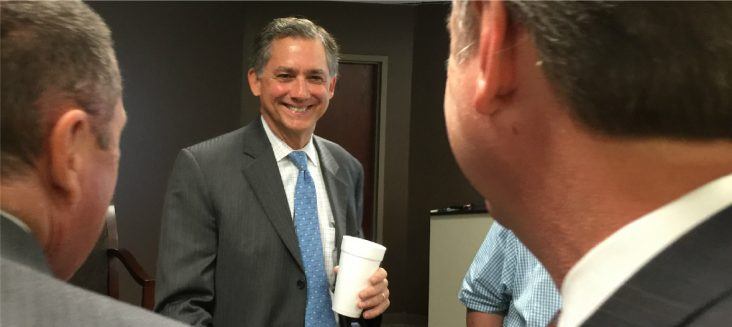U.S. Rep. French Hill sees September shot for CHOICE act to emerge from committee
by August 25, 2016 5:05 pm 194 views

At a recent forum of central Arkansas bankers, U.S. Rep. French Hill, R-Little Rock, offered his perspective on what was achievable and what would require future efforts to altering current banking laws. Hill, the former CEO of Delta Trust and Bank, is also a former U.S. Treasury official and served in the George H.W. Bush White House.
One of the most relevant legislative debates, according to Hill, centers on the Financial CHOICE act – a nearly 500-page bill introduced by Rep. Jeb Hensarling, R-Texas, aimed at rolling back Dodd-Frank Act’s extensive supervisory role and providing regulatory relief for banks of all sizes.
Talk Business & Politics Roby Brock quizzed Hill, who sits on the House Financial Services committee, on Congressional legislative activity affecting banks at the end of the forum.
TB&P: Tell me a little bit about the CHOICE act and what you hope it accomplishes?
Rep. French Hill: The CHOICE act is to look back over 6 years of Dodd-Frank, and the Dodd-Frank provisions and make changes that House Republicans think would lead to a better, safer, stronger banking industry.
TB&P: And we’re in an election year. It’s not going to be easy to get much legislation passed in an election year. What do you think the chances are that this legislation moves forward and what do you hope happens if it doesn’t move this year?
Rep. Hill: In September, I would hope we would have some hearings on the legislation and possibly a markup. I think that would be difficult. A markup is where the full legislation comes to the committee and is voted out of the committee and sent to the House. But I think there is a remote possibility we could have a markup. That would then tee up the CHOICE act and its provisions to work with the next president and the next Congress.
TB&P: Congress has passed about 30 changes to Dodd-Frank. What’s been one of the most significant things that you think that has been altered?
Rep. Hill: I think the most significant things that we’ve done are pass bi-partisan ideas along the way. They’re all small tweaks to Dodd-Frank and then we’ve tried to tackle things that affect the consumer and give the consumer more choice in mortgage products, more choice in checking account products, but they have been, they’ve been modest.
TB&P: Recently, the White House kicked out a pronouncement that Dodd-Frank has been a huge success. That it hasn’t negatively impacted banks at all? What’s your take on that?
Rep. Hill: Yeah, the Council of Economic Advisors (CEA) says that the Dodd-Frank act has not hurt community banks and that’s just contrary to the evidence. We see a profitability of community banks down, we see community bank lending to agriculture and small business down, and I thought it was… it verged on comical that the CEA said that the expansion of deposit insurance from a $100,000 per account to $250,000 per account was the top reason why Dodd-Frank had helped community banking.
TB&P: You mentioned you thought “viability” was the single greatest threat to the banking system right now in the U.S. Explain what you mean by that.
Rep. Hill: I think our financial services industry – both the capital markets industry, how we raise equity and debt capital through capital markets, and the community and regional and national banking industry – are all suffering because they can’t attract capital and good people for the reason of a slow economy. And what I think is too much regulation, not right-sized regulation, and it is a deterrent from people starting new banks or innovating new products… These are all things that really strike at the heart of viability of what Alexander Hamilton called the nurseries of national wealth: our banks. We must have them healthy in order to have a healthy economy.
